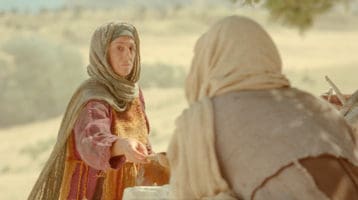Podcast: Play in new window | Download
Subscribe: RSS

Can This Be the Christ?
 The Samaritan woman came to Jacob’s well in search of ordinary water. But after her brief conversation with Jesus, she ended up leaving her water jar behind as she went to tell others about the extraordinary man she had just met who told her everything she did and who spoke to her about living water. “Can this be the Christ?” she asked them. On this program, the hosts will discuss the implications of this passage as they wrap up their discussion of chapter four in their continuing series on the Gospel of John.
The Samaritan woman came to Jacob’s well in search of ordinary water. But after her brief conversation with Jesus, she ended up leaving her water jar behind as she went to tell others about the extraordinary man she had just met who told her everything she did and who spoke to her about living water. “Can this be the Christ?” she asked them. On this program, the hosts will discuss the implications of this passage as they wrap up their discussion of chapter four in their continuing series on the Gospel of John.
Show Quote:
“In John 4:25, the woman says to Jesus, ‘I know that Messiah is coming (he who is called Christ). When he comes, he will tell us all things.’ And Jesus looks to her and says, ‘I who speak to you am he.’” – Shane Rosenthal
“This I think strikes me as another one of the many times that Jesus speaks with this authority of his identity. I’m the one. And this word Christ, of course, we know from history there was confusion on what that might be, but they’re all expecting this particular figure to show up.” – Caleb Bassett
Term to Learn:
“Christ’s Threefold Office”
Christ’s person and work are often spoken of as fulfilling three distinct offices: prophet, priest, and king, in both his humiliation and exaltation. Prophets are teachers, and covenant lawyers, carrying out the heavenly policy of which they speak. In the Mount of Transfiguration, Jesus is attended by Moses and Elijah, confirming his work as a prophet. The command to “listen to him” directly connects Jesus to God’s promise in Deuteronomy 18:15 to raise up a prophet like Moses. And yet, Jesus is also greater than Moses, acting as a mediator who can offer the forgiveness of sins in his person. Christ continues to be a prophet over his church by his Word and Spirit, inaugurating the new kingdom through his very words and actions, as the message about him and from him goes to the four corners of the earth.
Christ is also the great high priest whose sacrifice embodied the entire old covenant sacrificial system, and yet procured the redemption only foreshadowed by these rituals. Christ was the Melchizedek over the house of God, greater than the Levitical priesthood, purchasing the salvation for the elect by an indestructible sacrifice, by which he continually make intercession for his people, forever purifying our consciences. Christ is also the king. He is not only the Son of God according to eternal generation, but the Son of David’s line who fulfilled all the first Adam failed, providing true righteousness and holiness and triumphing over sin, death, and hell by his very death. His death purchased the right for the Son of Man to be raised in power to the right hand of the majesty on high, where he governs and rules in the midst of his enemies and brings all his people to glory. The offices of prophet, priest, and king find their completion in him alone. Through the fulfillment of these offices as the God-man, Christ offered the atonement needed to propitiate the wrath of God, reconcile men to himself, and purchase the heavenly kingdom. This was done, not from need or necessity, but according to the great love with which he has loved his people. (Adapted from Michael Horton,The Christian Faith: A Systematic Theology for Pilgrims on the Way, pp. 483-547)
(This podcast is by White Horse Inn. Discovered by Christian Podcast Central and our community — copyright is owned by the publisher, not Christian Podcast Central, and audio is streamed directly from their servers.)